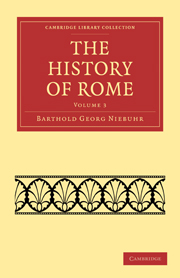Book contents
- Frontmatter
- PREFACE
- Contents
- The Licinian Rogations
- The new curule Dignities of the year 384
- Internal History down to the complete establishment of the plebeian Consulship
- On the Uncial Rate of Interest
- History of the Wars from 384 to 406
- Rome in Alliance with Latium
- The earliest Constitution of the manipular Legion
- The first Samnite War
- The Latin War
- The Laws of the Dictator Q. Publilius
- Internal History down to the Caudine Peace
- Alexander of Epirus
- Forein Relations down to the second Samnite War
- The second Samnite War
- Relations between Rome and the Nations bordering on Samnium after the Peace
- The Etruscan Wars down to the beginning of the third Samnite War
- Internal History from the Caudine Peace down to the third Samnite War
- Cn. Flavius
- The Censorship of Q. Fabius and P. Decius
- The Ogulnian Law
- Various Occurrences of the same Period
- The third Samnite War and the Others of the same Period
- Internal History from the Beginning of the second Samnite War down to the Lucanian
- Miscellaneous Occurrences of the same Period
- The Etruscan and Gallic War
- The Lucanian, Bruttian, fourth Samnite, and Tarentine Wars
- Epirus and Pyrrhus
- The Roman and Macedonian Tactics
- The War with Pyrrhus
- Entire Subjugation of Italy, and the Political Rights of the Italian Allies
- Internal History and Miscellaneous Occurrences of the Period from the Lucanian down to the first Punic War
- The first Punic War
- Index
- ERRATA
Forein Relations down to the second Samnite War
Published online by Cambridge University Press: 01 June 2011
- Frontmatter
- PREFACE
- Contents
- The Licinian Rogations
- The new curule Dignities of the year 384
- Internal History down to the complete establishment of the plebeian Consulship
- On the Uncial Rate of Interest
- History of the Wars from 384 to 406
- Rome in Alliance with Latium
- The earliest Constitution of the manipular Legion
- The first Samnite War
- The Latin War
- The Laws of the Dictator Q. Publilius
- Internal History down to the Caudine Peace
- Alexander of Epirus
- Forein Relations down to the second Samnite War
- The second Samnite War
- Relations between Rome and the Nations bordering on Samnium after the Peace
- The Etruscan Wars down to the beginning of the third Samnite War
- Internal History from the Caudine Peace down to the third Samnite War
- Cn. Flavius
- The Censorship of Q. Fabius and P. Decius
- The Ogulnian Law
- Various Occurrences of the same Period
- The third Samnite War and the Others of the same Period
- Internal History from the Beginning of the second Samnite War down to the Lucanian
- Miscellaneous Occurrences of the same Period
- The Etruscan and Gallic War
- The Lucanian, Bruttian, fourth Samnite, and Tarentine Wars
- Epirus and Pyrrhus
- The Roman and Macedonian Tactics
- The War with Pyrrhus
- Entire Subjugation of Italy, and the Political Rights of the Italian Allies
- Internal History and Miscellaneous Occurrences of the Period from the Lucanian down to the first Punic War
- The first Punic War
- Index
- ERRATA
Summary
In the same year, if Polybius's reckoning is correct, the Romans concluded the first peace with the Gauls; consequently for the same reasons which occasioned their peace with Alexander, and that they might be safe on this side during the war with the Samnites. Livy's account under the same year, that apprehensions of a Gallic invasion were spread abroad, and that a dictator was appointed: that the persons however sent out in order to collect information reported, that every thing was quiet among the Gauls, has an obscure reference to that statement: so far did the annals leave traces of an embassy despatcht to the Gauls; the mention of the peace was obliterated. To conclude such a peace with the Romans, who had no kind of connexion with them, unless they themselves marcht against Rome, the Gauls could have had no occasion, except it was solicited, and no reason to grant it, except presents, if not an annual tribute, which even the proudest have often considered to be no dishonour to pay to barbarians; for certainly this peace, which protected all nations dependent upon the Romans, however distant Rome herself was, almost put an end to their marauding expeditions. The northern boundary of Etruria was protected by the impassable nature of the Apennines: the road through the Abruzzi was easily defended by the brave inhabitants, and might have been dreaded by the barbarians on account of more than one defeat: there remained the middle road through Umbria which was certainly subdued, and down the lower Tiber.
- Type
- Chapter
- Information
- The History of Rome , pp. 171 - 185Publisher: Cambridge University PressPrint publication year: 2010First published in: 1842



